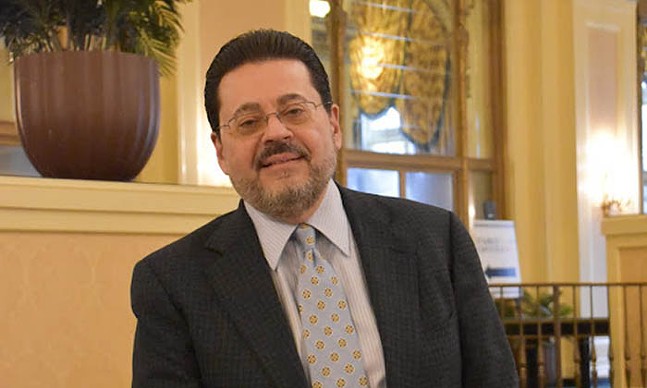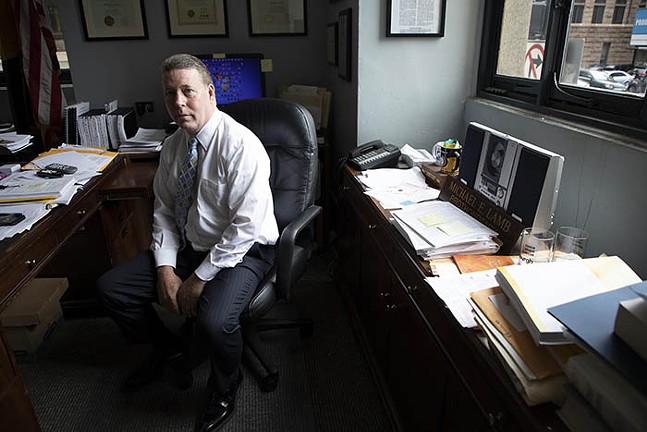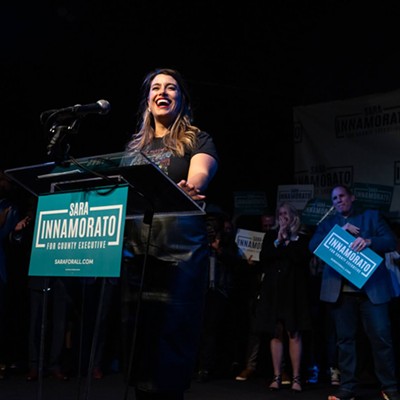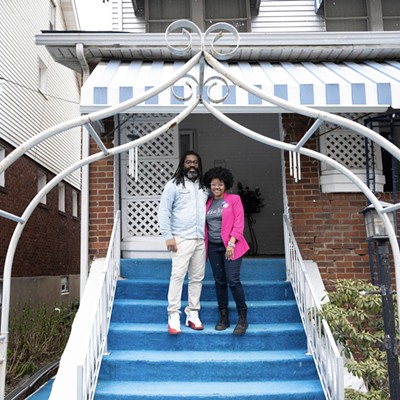
Pittsburgh City Paper partnered with PublicSource to produce this story.
PublicSource is a nonprofit newsroom serving the Pittsburgh region.
The role of money in politics has shifted in the social media age, and having the biggest pile of campaign cash does not always outweigh grassroots organizing and online momentum. Elections are not sold to the highest bidder — the region’s last two primary elections offer ample proof of that. But even the most grassroots candidates say money — and the ability to broadcast TV and digital ads — is still important.
Allegheny County Treasurer John Weinstein’s entrance into the race for executive this month made a splash and not only because of Weinstein’s considerable name recognition (taxpayers have made out checks to him since 1999). But he is also expected to bring a significant amount of campaign cash into the crowded race.
Weinstein will compete with state Rep. Sara Innamorato, who has earned support of progressive PACs and small-dollar contributors; city Controller Michael Lamb, who has built deep relationships over decades in city government; and three fundraising wild cards in Dave Fawcett, Erin McClelland, and Olivia Bennett.
Major labor unions are expected to take different sides and provide money to candidates, and the race could reveal how much small-dollar donors will engage in county-level elections.
Campaign finance filings revealing candidates’ positions entering 2023 are likely to be available in the coming days. Weinstein’s record of raising hundreds of thousands of dollars to fund his past campaigns for treasurer, and a handful of large checks written to his campaign account at the end of 2022 loom large over the race. Last time he entered an election year (2019), he had more than $425,000 in his campaign account — several times more than what any of his 2023 rivals have ever raised for an election.
“Given the choice between having a powerful fundraising machine and not having a powerful fundraising machine, always go with the fundraising,” said Jennie Sweet-Cushman, an assistant professor of political science at Chatham University. “There are inherent advantages there but those advantages don't necessarily translate into wins maybe like we might assume they would.”
Also changing the contours of the race, a slate of progressive officeholders have recently gained ground in Allegheny County, and donors are adjusting accordingly.
“The progressive train has left the station, and we're in this transitionary period,” Sweet-Cushman said. “And you may see things split a little along the predictable, kind of more conservative lines and the more progressive ones.”
John Weinstein and the strong arm of labor
Last election: 2019
Years of fundraising reviewed: 2018-21
Average contribution: $1,313
Top three contributors: Laborers District Council of Western PA PAC, First National Bank PAC, Friends of Randy Martini
“Labor needs a partner” in the executive’s office, Weinstein said at his Jan. 12 campaign launch. “And they’re going to have a partner.”
Campaign finance reports show that Weinstein and organized labor have been partnering for years. Locals associated with electrical workers, steamfitters, laborers, operating engineers, and others helped him raise hundreds of thousands of dollars for his campaigns for treasurer.
Weinstein reiterated in a January interview that he thinks labor should have an “advocate” in the executive’s office. “And when companies come to Western Pennsylvania they understand that we have talented people here, and give them a chance,” he said.
In the final days of 2022, before he announced his county executive run, the Western Pennsylvania Laborers PAC gave $50,000 to Weinstein’s campaign. The political action committee for Steamfitters Local 449 wrote a $102,000 check around the same time.
“People believe in me,” Weinstein said. “No one’s writing a check if they don’t believe in you, if they don’t think that you have the ability to do what you say.”
The full extent of Weinstein’s recent fundraising is not yet known, but building trade union leaders say they are squarely behind Weinstein.
“We all realize we need a good, strong county executive, not only someone who is labor friendly but someone who is business friendly,” said Kenneth Broadbent, business manager of the Steamfitters Local 449. “On this election, we’re all supporting John Weinstein.”
Broadbent keyed on the controversial subject of fracking, calling it a “clean, safe form of energy, and energy is the key to the middle class way of life.” Weinstein said he would be open to new fracking projects in the county if elected, though he said he favored a 2022 council measure to ban fracking in county parks.
Phil Ameris, president of the Laborers District Council of Western Pennsylvania, added that Weinstein will “be a fair voice for both labor and development,” and in a dig at more progressive candidates, said he will represent more than “a select few neighborhoods.”
“I don’t think people in the South Hills are interested in affordable housing,” Ameris said.
Unlike city and federal elections, there are no limits on contributions in county elections. Weinstein is likely to enjoy a significant, but not necessarily decisive financial advantage over five other announced candidates.
“You are going to be seeing a lot of commercials,” Weinstein told his audience Jan. 12.
Sara Innamorato, service unions and smaller checks
Last election: 2022
Years of fundraising reviewed: 2020-22
Average contribution: $138.60
Top three contributors: Allegheny County Democratic Delegation, software engineer David Turner, SEIU Healthcare PAC
While Weinstein backers hope this election will be a show of strength for building trade unions, a group of more progressive-leaning organizations could counteract their wave of money. Service Employees International Union (SEIU) Healthcare and 32BJ, the latter representing property service workers, poured big money into the 2021 race for Pittsburgh mayor. Both have endorsed Innamorato.
Leaders of the unions are hoping an Innamorato triumph — extending the progressive movement’s electoral winning streak — sends a message about the region’s priorities.
“We are standing with candidates who are on the front lines with workers,” said Silas Russell, political director of SEIU Healthcare. “And voters agree with healthcare workers that we need to hold powerful institutions accountable.”
The union backed Pittsburgh Mayor Ed Gainey, in his 2021 campaign, promised to hold UPMC to account and make the large, tax-exempt hospital system pay its “fair share” to the public sector. Innamorato has launched her campaign making similar pledges about the healthcare giant.
Russell said he hopes the next executive uses the county’s taxing authority to “hold institutions accountable, and make sure that purely public charities are living up to that status.”
More than any other candidate, Innamorato has raised big money from small-dollar donations. From 2020 through 2022, she received 1,003 campaign contributions, just 43 of which were of more than $500. The average contribution to her campaigns was $139, well below that of Weinstein or Lamb. Innamorato said in a January interview that her campaign had attracted contributions from 400 individual contributors.
“Money is going to be very important in this race, and fundraising will be vital,” Innamorato said. “Our campaign, we do have to be competitive and continue to raise dollars to run a countywide campaign that really speaks to people and brings them into the fold.”
She noted, though, that recent elections in the region have not always gone to the biggest spender: Gainey and Congresswoman Summer Lee each won competitive primaries despite being outspent.
Michael Lamb, looking for new sources
Last election: 2019
Years of fundraising reviewed: 2018-20
Average contribution: $542.98
Top three contributors: PACs associated with Laborers District Council of Western PA, Plumbers Local Union No. 27, Steamfitters Local 449
Lamb finds himself in uncharted waters. Some groups that were his biggest backers in city elections have already lined up behind Weinstein.
Lamb raised about $70,000 in 2019, the year of his most recent election, while running unopposed. But at least $25,000 of that came from PACs that have already pledged support for other executive candidates.
The Western PA Laborers PAC, for example, gave Lamb’s campaign $10,000 during his last election cycle, but the group is supporting Weinstein in 2023. The same goes for the Steamfitters, who gave his campaign $7,000 last election.
Broadbent said the building trade unions are fond of Lamb, but their support will go solely to Weinstein in 2023.
“The building trades all like Mike but figure John Weinstein is the candidate who can win,” he said, citing the need to avoid electing an executive who is “too far left or too far right.”
Lamb is undeterred, though, and said his fundraising efforts are going as planned.
“We are talking to people every day who are contributing to us,” he said in an interview. “Some of them have given to past races that I have been in, some of them who have given in past races that [Weinstein] has been in.”
Bennett, Fawcett, McClelland seek other paths
While the largest fundraiser shouldn’t necessarily be considered the frontrunner, Sweet-Cushman said, candidates must at least clear a minimum fundraising threshold to show they’re viable. With a crowd of relative newcomers challenging big establishment money, some could soon be facing questions about the strength of their campaign prospects.
Weinstein, Innamorato, and Lamb, each with recent, repeated success in local elections, have somewhat of a head start over the other three candidates for executive — county Councilwoman Bennett, attorney and former county Councilman Fawcett, and county Department of Human Services employee McClelland.
Bennett raised less than $10,000 for her successful county council race in 2019. Fawcett last ran for elected office 19 years ago. And McClelland raised a tidy $239,000 in a 2016 run for Congress, but in a starkly different context: She ran in a district that included vast swaths of three other counties that was overwhelmingly likely to be won by a Republican candidate.
Bennett said she’s avoiding larger corporate donors as part of a deliberate grassroots strategy.
“My campaign always has been and will always continue to be very people-centered,” she said. “We don’t go after big corporations.”
Bennett, whose progressive branding puts her in competition with Innamorato, said she’s hopeful she can win without a large budget by relying on low-cost campaigning tools like door-knocking and giving talks to small groups.
“[Weinstein and Lamb] have treasure chests of funds, that’s wonderful,” Bennett said. “But I don’t know if that’s going to translate for them. … We feel like getting in front of people and having one-to-one conversations” is more important than mass mailers and TV advertisements.
Fawcett hasn’t raised campaign funds for more than a decade after finishing his second county council term in 2008. But he said his record as a legal professional and civil liberties advocate has won him many allies and supporters who are willing to back him.
“I’m putting in the work to build a broad base of financial support and I’m not counting on any one entity to fund my campaign,” Fawcett said. “And at the same time, I expect that I will raise as much as the others in the race.”
Fawcett once argued a U.S. Supreme Court appeal on the grounds a West Virginia judge had been helped into office by more than $3 million of the defendant's money. Since then, he said he’s remained suspicious of large single-source campaign contributions.
“I think everyone knows that anyone – a person or organization – who really helps out a candidate in a big way probably expects something in return,” Fawcett said.
Charlie Wolfson is PublicSource’s local government reporter and a Report for America corps member. He can be reached at [email protected] or on Twitter @chwolfson.
Jamie Wiggan is City Paper’s news editor. He can be reached at [email protected] or on Twitter at @JamieWiggan
This story was fact-checked by Dakota Castro-Jarrett.





















